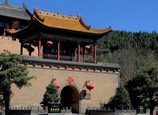
Zhao plays an important role in "Feng Shen Yan Yi" ("The Story of Chinese Gods"), a popular novel in the Ming Dynasty. In the story, he is a mortal with magic and martial arts skills, but he is assassinated when he assists the Emperor Zhou in the war against Jiang Ziya in the Shang Dynasty (16th century-11th century BC). When it ends in the collapse of the Shang Dynasty, Zhao is elevated by Jiang as a god of wealth. All heroes of the war, living and dead, are deified.
Together with his four assistants, namely zhao bao (attracting treasure|), na zhen (collecting jewelry), zhao cai (attracting fortune) and li shi (benefiting profit), Zhao governs all the fortunes and business in the world.
Regional operas based on "The Story of Chinese Gods" are often the highlights of temple fairs. The fierce battle between Zhao and other immortals is a favorite scene.
Wielding a silver whip, Zhao enters the stage and waves his whip, then flicks the flame in a traditional oil lamp. The lamp remains lighted but sparks starts small fires on the whip. In the Shanxi Opera, this scene draws continuous applause.
Honoring the God of Wealth
Gods of wealth like their statues to be placed in bright, busy places. Keep a continuous light on the statue and never fight or curse in the god's presence.
Gods of wealth usually don't have a preference when it comes to offerings, such as food, but most martial gods of wealth would like some wine.

















 Local villagers climb mountains to get relief supplies
Local villagers climb mountains to get relief supplies


![]()
